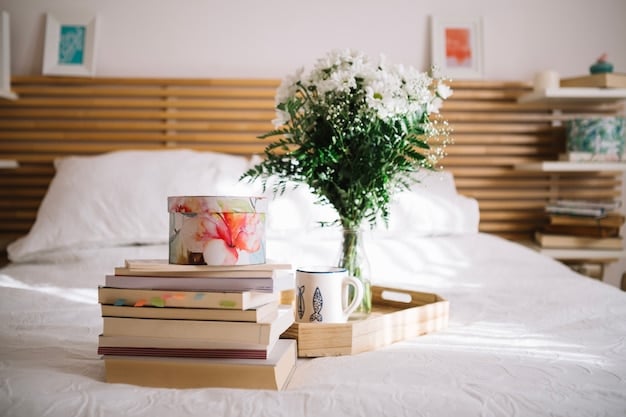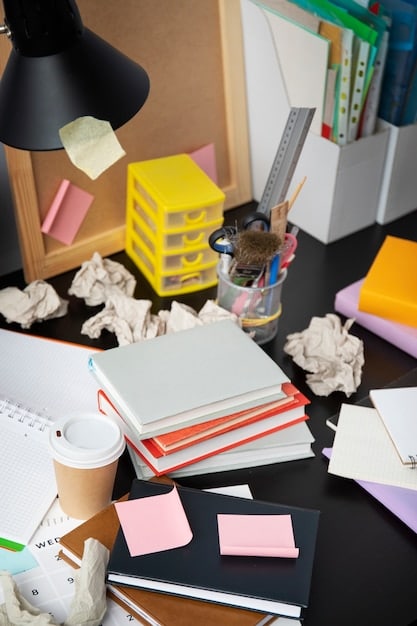Declutter Your Way to Calm: How Clutter Impacts Stress Levels

The impact of clutter on your stress levels is significant, as a disorganized environment can lead to feelings of overwhelm, anxiety, and decreased cognitive function; decluttering can promote a sense of control and tranquility.
Does your messy space make you feel stressed out? The connection between clutter and stress is real. Let’s explore the impact of clutter on your stress levels: Declutter your space, declutter your mind.
Understanding the Clutter-Stress Connection
Clutter isn’t just about being messy; it’s a psychological burden. Understanding how our surroundings affect our mental state is the first step in addressing the problem.
The Psychology of Clutter
Clutter can create a sense of chaos and disorder, which directly impacts our mental well-being. It’s more than just visual noise; it’s a constant reminder of unfinished tasks and unmade decisions.
- Cognitive Overload: Too much visual stimuli can overwhelm our brains, making it difficult to focus and process information.
- Emotional Burden: Clutter can trigger feelings of guilt, embarrassment, and anxiety about not being organized or productive.
- Sense of Control: A cluttered environment can make us feel like we lack control over our surroundings, leading to increased stress.
Imagine constantly searching for misplaced items or navigating through piles of belongings. These small inconveniences add up and contribute to chronic stress.
Ultimately, the connection between clutter and stress is rooted in our innate need for order and control. When our environment feels chaotic, our minds often follow suit.
The Science Behind Clutter and Stress Hormones
While it might seem like a surface-level issue, research shows that clutter can actually affect our bodies on a hormonal level. Studies have revealed a link between disorganized spaces and increased levels of cortisol, the stress hormone.
Experiencing a cluttered environment over time can lead to chronic stress, impacting mood, sleep, and overall health. Understanding the science behind this connection provides a strong incentive for decluttering.

Cortisol and Chronic Stress
Cortisol, when released in short bursts, is essential for managing stress. However, chronically elevated cortisol levels can have detrimental effects.
- Sleep Disruption: High cortisol levels can interfere with sleep patterns, leading to insomnia and fatigue.
- Immune System Suppression: Prolonged stress can weaken the immune system, making us more susceptible to illness.
- Weight Gain: Cortisol can increase appetite and encourage the storage of fat, especially around the abdomen.
Addressing clutter, therefore, isn’t just about tidying up. It’s about managing your body’s physiological response to your environment and mitigating the harmful effects of chronic stress.
By reducing the visual chaos around us, we can help lower cortisol production and promote a healthier, more balanced hormonal state.
Identifying Your Clutter Triggers
Everyone’s relationship with clutter is unique. Recognizing the triggers that lead to accumulation is essential for making lasting changes.
Becoming mindful of these triggers allows you to develop strategies to prevent clutter from building up in the first place. It’s about breaking the cycle before it starts.
Common Clutter Culprits
From emotional attachment to procrastination, there are several common reasons why clutter accumulates.
- Emotional Attachment: Holding onto items due to sentimental value, even if they no longer serve a purpose.
- Fear of Waste: Keeping things “just in case” to avoid feeling wasteful, even if the likelihood of needing them is slim.
- Procrastination: Putting off decisions about what to keep and what to discard, leading to piles of unprocessed belongings.
By identifying your own clutter triggers, you can begin to address the underlying issues and develop healthier habits.
For instance, if emotional attachment is a struggle, try taking photos of items instead of keeping the physical objects. If procrastination is the culprit, schedule regular decluttering sessions to tackle tasks in manageable chunks.
Practical Decluttering Strategies to Reduce Stress
Now that we understand the problem, let’s dive into practical strategies for decluttering your space and, in turn, decluttering your mind.
These strategies focus on creating a sustainable system that not only removes clutter but also prevents it from returning. It’s about building habits that support a more organized and peaceful lifestyle.

Start Small and Set Realistic Goals
Overwhelmed by the prospect of decluttering your entire home? Break it down into smaller, more manageable tasks.
- One Room at a Time: Focus on decluttering one room or area at a time, such as a desk, closet, or drawer.
- Set a Timer: Dedicate 15-30 minutes each day to decluttering, and stop when the timer goes off.
- Celebrate Progress: Acknowledge and celebrate small victories to stay motivated and build momentum.
Rome wasn’t built in a day, and neither is a clutter-free home. Be patient with yourself and celebrate each step forward.
Remember, consistency is key. Even small, regular decluttering efforts can make a significant difference over time.
The Mindful Decluttering Approach
Decluttering isn’t just about getting rid of stuff; it’s about making conscious decisions about what you want to keep in your life. Mindful decluttering involves being present and intentional throughout the process.
Rather than blindly discarding items, take the time to reflect on each object’s purpose and impact. This approach can transform decluttering from a chore into a powerful act of self-care.
Asking the Right Questions
Engage with your belongings by asking yourself thoughtful questions. These questions help to clarify your values and priorities.
- Does this item bring me joy? If not, consider whether it’s truly serving a purpose in your life.
- When was the last time I used this item? If it’s been more than a year, it might be time to let it go.
- If I didn’t already own this, would I buy it again? This question helps to cut through sentimental attachment and evaluate the item’s true value.
Mindful decluttering can be a transformative experience, leading to a greater sense of clarity and intention in all aspects of your life.
By consciously curating your belongings, you create a space that reflects your values and supports your well-being.
Maintaining a Clutter-Free Environment Long-Term
Decluttering is just the first step. The real challenge lies in maintaining a clutter-free environment over the long term. This requires developing new habits and systems that prevent clutter from re-accumulating.
By implementing these strategies, you can create a sustainable system that supports a more organized and peaceful lifestyle.
Establishing New Habits
Prevent clutter from returning by incorporating these habits into your daily routine.
- One In, One Out: For every new item you bring into your home, get rid of something similar.
- Put Things Away Immediately: Develop the habit of putting items back in their designated places as soon as you’re finished using them.
- Regular Decluttering Sessions: Schedule regular decluttering sessions to prevent clutter from building up in the first place.
Ultimately, maintaining a clutter-free environment is about creating a lifestyle that prioritizes order, intention, and mindfulness.
By adopting these habits, you can transform your home into a sanctuary of calm and tranquility.
| Key Point | Brief Description |
|---|---|
| 🧠 Clutter & Stress | Clutter increases stress, affecting mental and physical well-being. |
| 📅 Small Steps | Decluttering is more manageable when broken into small, achievable tasks. |
| ❤️ Mindful Choices | Evaluate each item’s purpose & emotional impact. Keep only what matters. |
| 🌱 New Habits | Prevent further clutter by establishing ‘one in, one out’ and quick clean-up routines. |
Frequently Asked Questions
Clutter overstimulates the brain, leading to difficulty focusing and processing thoughts. This overwhelm can manifest as anxiety, irritability, and a general sense of unease.
Start by decluttering your immediate workspace or bedroom. Clearing these visually prominent areas can provide a sense of control and reduce the visual stimulation contributing to stress.
Yes, minimalism should enhance, not detract from, your life. Extreme minimalism can lead to stress if it causes deprivation or makes daily tasks inconvenient. Find a balance.
Acknowledge the emotion but question its necessity. Take photos of sentimental items or repurpose them into something new. Consider donating items to those in need.
Involve children in age-appropriate decluttering. Set clear storage rules and make it a routine. Regularly cull toys and clothes they’ve outgrown with their participation.
Conclusion
In conclusion, by understanding the impact of clutter on your stress levels: Declutter your space, declutter your mind, you can take proactive steps to create a calmer, more peaceful life. Start small, be mindful, and develop sustainable habits to enjoy the long-term benefits of a clutter-free environment.





